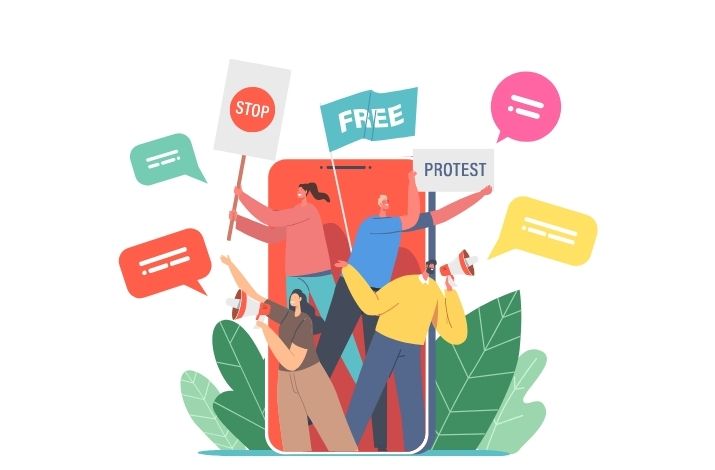Online Social and Political Activism in Turkey

Hey, NEWS updated, fellas! This topic is especially for you!
Do you know about activism? Activism is an action that uses vigorous campaigning to catalyse political or social change. Traditionally, activism was performed through TV, print media or radio shows, but modern problems require modern solutions. By taking this into consideration, activism also becomes online. Recently, it has showcased its potential to reshape political discourse and mobilise citizens in Turkey. The digitalisation power of online activism provides people with a space to express their thoughts and advocacy because traditional activism is facing censorship and restrictions.
About half the population of Turkey consists of individuals below 30. It explains why they are active in entertainment circles such as video gaming and online gambling. Many of the Turkish users at 7Slots casino are young adults who sign in to enjoy their favorite slots and casino games. Most of the young population has only experienced the country’s leadership under President Recep Tayyip Erdogan under the Justice and Development Party abbreviated AKP in English.
Let’s take a dive into online social and political activism in Turkey to understand the potential of online activism!

Historical Context of Online Social and Political Activism in Turkey
The history of online social and political activism in Turkey has deeper roots in the soil of Turkey. In order to understand the context, we need to go deep into it.
Gezi Park Protests (2013)
Just remember history repeats itself. I am trying to indicate the Gezi Park protests that marked a significant turn in Turkish activism. When people have no specific talk about police brutality in traditional media, whether print or radio; they started using social media platforms.
On that specific occasion, Twitter and other social media platforms play a critical role in exposing and disseminating information, documenting police, and coordinating actions. People use hashtags like #direngeziparkı and resist Gezi Park’s trend, and they highlight the potential of online activism.
Post-Coup Attempt (2016)
The Turkish government organised a faction named Peace at Home Council in the Turkish Armed Forces. On July 15, 2016, this faction tried to take control of different places, like Marmaris, Ankara, and Istanbul. Fortunately, the attempt of the Peace at Home Council became fail because of several reasons. Armed forces and civilians both jumped into it and caused its failure.
After that failure, the Turkish government intensified its crackdown on dissent to stop another attempt by such forces. Further, online social and political activism became a battlefield for civilians to communicate about the Post-Coup Attempt. Further, they express their views the failed Post-Coup Attempt for better understanding.
Platforms and Strategies to Conduct Activism in Turkey
X
X, also known as the digital town square, remains a central platform for political discussions in any country. Activists are using the platform when its name was Twitter to share information and organise campaigns.
Facebook is a pillar in the world of social media that is continuously growing as a place to organise events and share content. Despite government surveillance, it plays a critical role in connecting like-minded civilians.
WhatsApp is a messaging app that enables users to communicate securely with activists. However, there are some concerns about surveillance that persist.
Blogs and Independent NEWS Sites
Blogs and independent NEWS websites are two main sources of spreading information and conducting secure communication among young blood. However, they are challenging mainstream media, but also facing some challenges to give breathe to activism in Turkey.
Challenges and Risks to Activism in Turkey
Online social and political activism in Turkey faces many challenges and risks. Some of them are described below.
Censorship
The Turkish government is very active in removing offensive online content that is against the government. Further, this process leads to account suspension and post-removals. The government can also restrict certain people from accessing the website again.
Legal Threats
Those who are active on social media platforms face legal considerations for their online activities against the government and laws. Moreover, they can be accused of charges, such as “spreading terrorist propaganda” and “insulting the president.”
Self-Censorship
When the fear rises, people start censoring themselves. This process limits the effectiveness of online activism, which is causing the slow death of criticism.
Troll Farms and Disinformation
There are some pro-government troll accounts that usually spread disinformation and attack activism in Turkey. Further, these accounts play an essential role in manipulating public opinion.
Success Stories
Women Empowerment
Some old-fashioned men who preferred patriarchy were against women’s empowerment. On that occasion, people started online campaigns to advocate women’s rights and their empowerment. These campaigns took traction, and hashtags like #ChallengeAccepted, #İstanbulSözleşmesiYaşatır, and #KeeptheIstanbulConventionAlive trends. By doing so, people highlight and indicate gender-based violence and gender brutality that took track, and now women are independent.
Occupy Gezi Legacy
As long as Turkey promotes art, grassroots, and music, the Gezi spirit will continue to live on. Further, online platforms continue to foster dialogue and resistance to breathe the spirit of social activism in Turkey. This approach also makes activism stronger to face harder conditions in the future to get privacy and rights.
The Closing Remarks
Online social and political activism in Turkey faces many challenging situations, but fortunately, it remains resilient. As long as social media platforms and other digital platforms provide civilians with free space to express their views, people will continue to do so. Whenever people see things that are unbearable actions, they post them on social media platforms to aware other people. Moreover, they showcase that social media has the potential to enable people to advocate for change and hold them in account.
FAQs
Q1- What is the political status of Turkey?
Turkey is a presidential and republic constitutional state that represents a pluriform multiple-party system where the president, parliament, and judiciary share power.
Q2- Is Turkey’s economy good?
The answer to this question is technical, like in which context you are asking matters. However, Turkey became the 19th largest economy, and its GDP was hyped to $905 billion.
Q3- What is Turkey’s main source of income?
The main source of Turkey’s income is its service areas, whereas its industrial and agriculture sectors contribute a significant part.
Q4- Is Turkey richer than the UK?
No. Turkey is not richer than the United Kingdom because the UK is the 19th richest economy per capita and Turkey is on the 49th number.
Q5- Why is Turkey so cheap?
Turkey’s Lira has a much lower value than other currencies; therefore, Turkey feels cheap.




